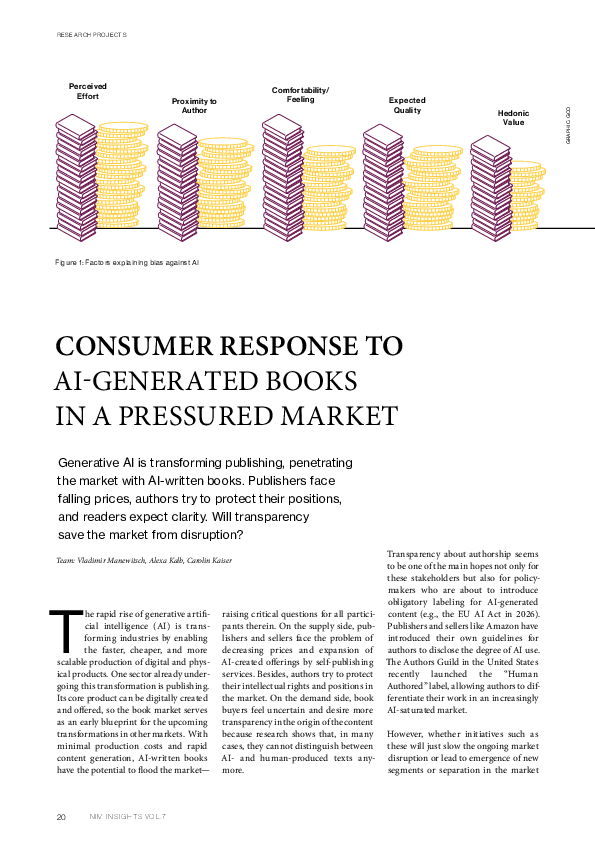Research
Consumer Response to AI-Generated Books in a Pressured Market
Generative AI is transforming publishing, penetrating the market with AI-written books. Publishers face falling prices, authors try to protect their positions, and readers expect clarity. Will transparency save the market from disruption?
The rapid rise of generative artificial intelligence (AI) is transforming industries by enabling the faster, cheaper, and more scalable production of digital and physical products. One sector already undergoing this transformation is publishing. Its core product can be digitally created and offered, so the book market serves as an early blueprint for the upcoming transformations in other markets. With minimal production costs and rapid content generation, AI-written books have the potential to flood the market – raising critical questions for all participants therein. On the supply side, publishers and sellers face the problem of decreasing prices and expansion of AI-created offerings by self-publishing services. Besides, authors try to protect their intellectual rights and positions in the market. On the demand side, book buyers feel uncertain and desire more transparency in the origin of the content because research shows that, in many cases, they cannot distinguish between AI- and human-produced texts anymore. Transparency about authorship seems to be one of the main hopes not only for these stakeholders but also for policymakers who are about to introduce obligatory labeling for AI-generated content (e.g., the EU AI Act in 2026). Publishers and sellers like Amazon have introduced their own guidelines for authors to disclose the degree of AI use. The Authors Guild in the United States recently launched the “Human Authored” label, allowing authors to differentiate their work in an increasingly AI-saturated market.
However, whether initiatives such as these will just slow the ongoing market disruption or lead to emergence of new segments or separation in the market depends primarily on consumer reactions to this transparency. Several questions are thus pertinent: Are consumers’ perceptions of and attitudes toward AI-versus human-written books inherently dierent? Will consumers’ behavior change with disclosure of authorship? Which psychological constructs can explain the potential differences in preference and behavior? Are these differences temporary until AI books become more common in the market and consumers become more familiar with them?
Research Design
To explore these questions, a team of researchers from the Nuremberg Institute for Market Decisions (NIM) conducted an online experimental study with a representative sample of the U.S. adult population. Each of approximately 1,100 participants first chose his or her most preferred category from a selection of the ten most popular fiction and nonfiction genres. Participants were then presented with two new books in the selected category to mimic the sale pages in online book shops and were asked for their perceptions and evaluations. By means of an experimental design, the researchers randomly manipulated the authorship of the two books and clearly marked them so that each participant consciously evaluated one book as AI-written and the other as human-written. The research focus was on purchase consideration approximated by reading interest and monetary valuations of the books as well as on psychological constructs collected from the literature, which were identified as possible explanation mechanisms for potential behavioral differences. Finally, the respondents had to choose between the two equally priced books to reveal their preference.
Implications
For all market participants, this research indicates that the origin of the book’s content – that is, whether it was written by a human or AI – and transparency about that origin are important factors. Furthermore, the findings suggest that the observed devaluation of AI books may diminish but not disappear in the medium term. Thus, the quality concerns will probably vanish in the near future especially for nonfiction works because AI texts will further improve. However, other drivers of the AI devaluation, like perceptions of perceived author effort or proximity to the author, are likely to remain effective. Hence, the results could indicate that with coming transparency, the market will see the emergence of new segments for AI books or perhaps a separation of human- and AI-created works.
MAIN RESULTS
- Subsequent statistical analysis of the data revealed that consumers perceived human-written books more positively in all investigated dimensions than ones written by AI. They also valued human works more highly by expressing greater willingness to pay for them and preferring them in the choice condition. These results are in line with previous research in related domains, such as art, poetry, and music. Notably, this so-called bias against AI was also observed for nonfiction books, albeit to a lesser extent than for fiction books. This may suggest that consumers have stronger beliefs in favor of human authorship with respect to creativity than with respect to expert knowledge.
- The main findings of the study shed light on potential explanations for this bias against AI. Indeed, among all investigated explanatory factors, the perceived effort of writing a book best explained consumers’ preferences for AI- versus human-authored books in reading interest as well as in monetary valuation (see Figure 1). Additional effective explanations were comfort with or feelings about a book, expected quality, and perceived proximity to the author. To a lesser extent, the differences were explained by perceptions of utilitarian or hedonic value or of the uniqueness of the book. Remarkably, the order of relevance of these explanatory factors was similar for fiction and nonfiction books.
Project team
- Dr. Vladimir Manewitsch, Senior Researcher, NIM, vladimir.manewitsch@nim.org
- Dr. Carolin Kaiser, Head of Artificial Intelligence, NIM, carolin.kaiser@nim.org
Contact


![[Translate to English:] [Translate to English:]](/fileadmin/PUBLIC/1_NIM_NIM/Team/V.Manewitsch_NIM.png)